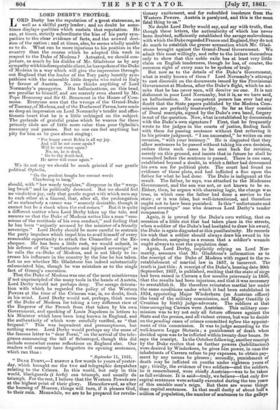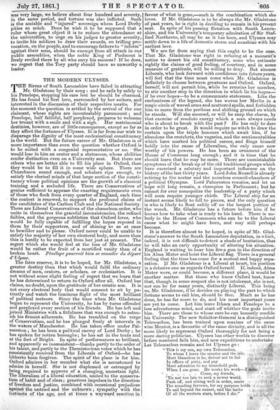LORD DERBY'S PROTEGE. L ORD Derby has the reputation of a
great statesman, as well as a skilful party leader ; and no doubt he some- times displays qualities which sustain that reputation. He can, at times, strictly subordinate the bias of his party sym- pathies to the clear evidence of facts, and the avowed deci- sion of the nation ; and at times, also, he seems wholly unable so to do. What can be more injurious to his position in the country than the course which he adopted this week in respect to the Duke of Modena ? Actuated, we should con- jecture, as much by his dislike of Mr. Gladstone as by any sympathy withhis disreputable client, he has spoken of the Duke of Modena in a way which will give the impression through- out England that the leader of the Tory party heartily sym- pathizes with the miserable little despots who ruled in Italy by favour of Austria. No one thinks anything of Lord Normanby's panegyrics. His hallucinations, on this head, are peculiar to himself, and are scarcely even shared by Mr. Pope Hennessy and Sir G. Beaumont in the House of Com- mons. Everyone sees that the wrongs of the Grand-Duke of Tuscany, of Modena, and of the Duchessof Parma, have made so deep an impression on Lord Normanby's tender and affec- tionate heart that he is a little unhinged on the subject. The garlands of grateful praise which he weaves for these princely idols are of little more value than poor Ophelia's rosemary and pansies. But no one can feel anything but pity for him as be goes about singing: "For bonny sweet Robin is all my joy.
And will he not comeagain ? Will he not come again? No, no, he is dead, Go to thy death-bed,
He never will come again."
We do not say we should be much grieved if our gentle political Ophelia, "On the pendent boughs her coronet weeds Clambering to hang," .
should, with "her weedy trophies," disappear in the" weep- ing brook" and be politically drowned. But we should feel no vindictive joy, only that gentle regret with which men say to each other at a funeral, that, after all, the prolongation of so melancholy a career was "scarcely desirable, though it cannot but be a shock when the end comes." But it is quite a different matter when Lord Derby takes up the tale, and assures us that the Duke of Modena writes like a man "con- scious of the rectitude of his own conduct," and feeling that he has been "unjustly accused by the minister of a friendly sovereign." Lord Derby should be more careful to restrain the party impulses which impel him to avail himself of every reasonable opportunity to attack the Chancellor of the Ex- chequer. He has been a little rash, we would submit, in his defence of this "unfortunate and injured sovereign" as he calls the ex-Duke of Modena, and is not likely to in- crease his influence in the country by the line he has taken. Let us see whether Mr. Gladstone has indeed substantially calumniated him, though he was mistaken as to the single fact of Granaj's execution. That the Duke of Modena was one of the most mischievous if not unprincipled of the many tools in the hands of Austria, Lord Derby would not perhaps deny. The savage detesta- tion with which he regarded the policy of the Western Powers at the time of the Crimean war, is, no doubt, fresh in his mind. Lord Derby would not, perhaps, think worse of the Duke of Modena for taking a very different view of the Emperor of the French from that taken by his own Government, and speaking of Louis Napoleon in letters to his Minister which have been long known in England, and the authenticity of which were carefully verified, as "that brigand." This was imprudent and presumptuous, but nothing worse. Lord Derby would perhaps say the same of the famous letter to "dear Forni," on the arrival of the tele- grams announcing the fall of Sebastopol, though this did include somewhat coarse reflections on England also. Our readers will scarcely have forgotten its opening sentences, which ran thus :
"September 11, 1855,
"DEAR FORNI,--I answer a few words to yours of yester- day, which brought me the two sad telegraphic despatches relating to the Crimea. In this world, but only in this world, blackguards a birbi) can triumph, and usually do triumph. For the rest, I believe that the Western Powers are at the highest point of their glory. Henceforward, as after the burning of Moscow, things will turn, if it pleases God, to their ruin. Meanwhile, we are to be prepared for revolu- tionary excitement, and for redoubled insolence from the Western Powers. Austria is paralyzed, and this is the most fatal thing to us." No doubt Lord Derby would say, and say with truth, that though these letters, the authenticity of which has never been doubted, sufficiently established the savage malevolence with which theD nice regardedFrance and England, they do not do much to establish the graver accusation which Mr. Glad- stone brought against the Grand-Ducal Government. We admit this most willingly, and refer to the letters themselves only to show that this noble exile has at least very little claim on English tenderness, though he has' of course, the common right of every man to be spoken of truly. But now as to the details of the Duke's Government, what is really known of them ? Lord Normanby's attempt to cast discredit on the documents issued by the Provisional Government at Modena, after the Duke's flight, which he ad- mits that he has never seen, will deceive no one. It is not dishonest in poor Lord Normanby, but it is, as we have said, an hallucination. No competent person has ever had any doubt that the State papers published by the Modena Com- mission are perfectly trustworthy. So far as they consist of Ducal rescripts, signed by the Duke's own hand, forgery is out of the question. Now, what is established by documents with the Duke's own signature ? First, that he frequently wrote to the judges in the courts of justice, finding fault with them for passing sentence without first referrmg it to his private judgment. "I am nauseated," he writes on one occasion, "with your leniency." He is disgusted that they allow sentences to be passed without taking his own decision, orders three such cases to be sent back for revision, merely on this ground, and insists that in future he shall be consulted before the sentence is passed. There is one case, established beyond a doubt, in which a father had denounced his own sou for political plots. The court had found no evidence of these plots, and had inflicted a flue upon the father for what he had done. The Duke is indignant at the result. The father, he says, was attached to the Modenese Government, and the son was not, or not known to be so. Either, then, he argues with charming logic, the charge was true, in which case the father had done a service to the state ; or it was false, but well-intentioned, and therefore ought not to have been punished. Is this" unfortunate and injured sovereign" one who deserves Lord Derby's tender compassion ?
Again, it is proved by the Duke's own writing, that on occasion of a little riot that had taken place in the streets, when a soldier of the Duke's had hesitated to draw his sword, the Duke is again disgusted at this pusillanimity. He records his wish that a soldier should always draw his sword in his own defence, assigning as a reason that a soldier's wounds ought always to cost the population dear. Again, Lord Derby, implicitly relying on Lord Nor- manby, assumes that Mr. Gladstone's information as to the rescript of the Duke of Modena with regard to the re- establishment of martial law in 1857, is incorrect. The truth is just this : A rescript of the Duke's, bearing date 30th September, 1857, is published, reciting that the state of siege had been raised in Carrara a few months prievously in 1856, that the results had been injurious, and that it was necessary to reestablish it. He therefore reinstates martial law under the same conditions under which it had been established in 1854, appointing Major Wiederkern (an Austrian officer) the head of the military commission, and Major Gentilly (a Croatian by birth) judge-advocate. The soldiers at that time occupying Carrara were Austrian. This military com- mission was to try not only all future offences against the State and the person, and all violent crimes, but was to decide on the pending cases of crimes committed before the appoint- ment of this commission. It was to judge according to the well-known Legge Stataria ; a punishment of death when decided upon was to be inflicted within twenty-four hours. So says the rescript. In the October following, another rescript by the Duke recites that as further powers (habilitazioni) were desired by Wiederkern, he gives him power, in case the inhabitants of Carrara refuse to pay expenses, to obtain pay- ment by any means he pleases ; secondly, punishment of death may be inflicted on youths under eighteen years of age ; thirdly, the evidence of two soldiers—and the soldiers, be it remembered, were chiefly Austrian—was to be taken as full evidence. It is said—truly, we believe—that only five capital sentences were actually executed during the ten years of this amiable man's reign. But there are worse things than capital sentences. In that small duchy of about half a million of population, the number of sentences to the galleys was very large, we believe about four hundred and seventy, in the same period, and torture was also inflicted. Such is the amiable and "injured" sovereign whom Lord Derby pities so milch. Does he wish it to be supposed that a ruler whose great object it is to reduce the attendance at the universities, to urge on his judges to greater severity, to incite his soldiers to draw their swords, on trifling pro- vocation, on the people, and to encourage fathers to "inform" against their sons, should be exempt from all attack in our public assemblies, when the noble King of Piedmont is freely reviled there by all who envy his success? If he does, we regret that the Tory party should have so unworthy a leader.































 Previous page
Previous page